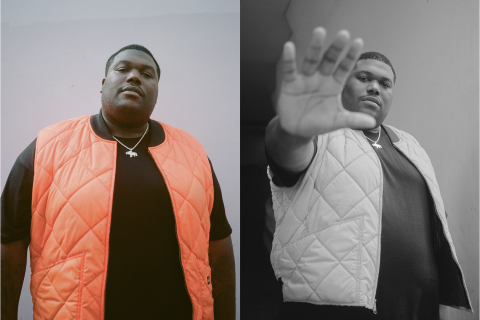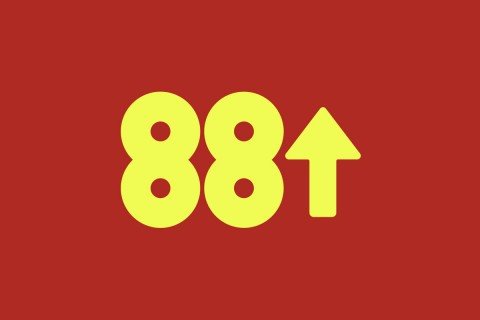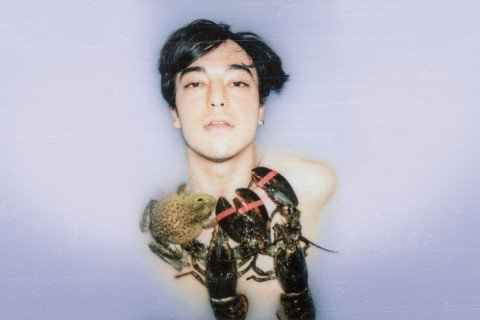
It’s not often you get to chat to someone like Niki. The 20-year-old grew up in Indonesia, supported Taylor Swift at the age of 15, studied music in Nashville and is now on the main roster of the internationally recognised record label and media company 88rising, which in the last few years has gained notoriety for being an authority on how to create Asian and American pop-culture crossovers. Casual.
I caught up with Niki at her hotel in New York City on the eve of the release of 88rising’s Head in The Clouds II, the second compilation from the cult label which sees members of the 88 roster (Joji, Rich Brian, Higher Brothers, Niki) paired with features from major pop acts from Asia such as Thailand’s Phum Viphurit and Korean star Chung Ha.
Niki’s demeanour is bubbly but never forced, she’s sharp, quick-witted, and is genuinely likeable. We spoke about the differences between Australia, America, and Asia, her childhood memories visiting family in Australia, and we even touched on the embarrassing phenomenon of drunk bogans in Bali, something only Indonesians and Australians are acutely aware of.
Hey Niki, how are you doing?
I’m good, how are you? Where are you from?
Melbourne, have you been?
Amazing! Yeah, I have family in Kew.
Oh you do? Super random.
Super random, right? Cause I’m from Indonesia so it’s like, we’re neighbours.
Right of course! We’re very close. I haven’t been to Indonesia before, Malaysia is the closest I’ve been.
Right. Everyone has ‘schoolies’ in Bali right?
Right. Oh my god yikes, too many Australians in Bali.
Yeah, too many drunk Aussies.
Yeah I haven’t done it, I don’t want to contribute to that. I’m not that kind of Australian.
[Laughs] Yeah I don’t think you should!
So growing up in Indonesia, what kind of music were you listening to? Was it mostly Western music or Asian music or both?
I was definitely listening to a lot of western music because my mom was into ’90s R&B and gospel so that’s what I grew up on but I was definitely listening to some Asian artists too.
Who were some of your favourites growing up?
I was listening to TLC, Aaliyah, Destiny’s Child, Boys II Men, all those kind of like, ’90s divas.
Okay, your mum had good taste!
Yeah, she really did! Locally, I was listening to this girl named Rossa who’s really cool. [And] Anggun—she became like this French international sensation from Indonesia.
You first started out doing covers and some originals and posting them on YouTube right? What can you tell me about those times and how you utilised the internet to connect with your audience when you were starting out?
Totally, yeah. So in school I was always known as the music girl. That was my identity sort of, and then as I grew up I discovered the internet, discovered YouTube, and that became my outlet for creativity I guess. Music was sort of my escape because I didn’t want to do stupid biology or whatever, you know? So in my free time, and actually as a means to procrastinate—too much actually—I would be playing music or making my own songs and just put it up on the internet.
What do you remember about the first time you ever performed live?
I would consider my first performance to be… I opened for Taylor Swift. Casual. [Laughs]
Yeah, wow. Humble first gig.
[Laughs] Right! Super casual. I opened for her in 2015, I was a wee little tot, I was 15. I won a competition, that’s how she chose the opening acts for the Asian leg of her Red tour. So every country had a winner and so somehow I won in Indonesia. I performed like three songs but it felt like the shortest and longest 15 minutes of my life at the same time. It was like 20,000 people, at the biggest arena in Jakarta. It was honestly a really surreal experience but after that I was like yeah, okay I think I like this, I think I wanna keep doing this. [Laughs]
How did you first get into producing?
It’s kind of funny, when I was doing my YouTube videos I had to use GarageBand to record my voice and my guitar because that’s all I knew how to do at the time. Then one day I accidentally clicked a button and it revealed the sound library on GarageBand and there were all these basslines and drum sounds and everything. It was really just a happy accident because that’s how I started to learn to produce, I started layering things. I was like “Ooh okay, you don’t need to learn to play all the instruments. Technology!”
Are there any producers you admire?
Well, Pharell of course. He’s an OG and his production style is so signature to him. In the pop game, I think the Scandanavians always have it tight like Max Martin and Shellback. I like a lot of underground producers too but I’m bad with names!
So you released your second EP Wanna Take This Downtown earlier this year. This one is a little more traditionally pop sounding than your previous EP. What inspired that change in direction for you?
Yes, for sure! I’m very inspired by who or what I’m listening to at the time. So whenever I put out a project, what I want people to know is that it’s what represents me at that time, but I wouldn’t say that it’s the be-all, end-all full encapsulation of me as an artist, because my taste is very versatile. At the time, I was honestly just listening to a lot of pop and I was captivated by the witty lyricism and structured songwriting. I wrote that EP at a time where there was very little structure in my life, so that yin and yang effect drew me in. I’d never written to such an ABAB format and that’s what I loved about all the underground pop artists I was listening to like Maisie Peters who is one of my really good friends, Lennon Stella, Alec Benjamin. All these singer-songwriters turned pop artists, I think the lyricism coupled with clean slick production is just a vibe in itself, it’s the millennial type of pop. That’s where I was at at the time, but as an artist I’m always evolving.
What was it like for you to study music in America and how did the move to the US help you evolve as an artist?
I had a bit of an identity crisis growing up in Indonesia because I went to an English speaking school but everybody outside of school didn’t speak English, so I was stuck between two worlds. It’s funny because I grew up thinking I knew everything about the US, I had a lot of American friends and teachers, I was watching American television so I was like “Clearly, I know everything about America.” But when I finally moved here I went through total culture shock. Back in Indonesia I would speak English all day at school and then go home and eat Indonesian food, you know what I’m saying? But then here I would go to the cafeteria and have to eat like, meatloaf.
It’s just the little differences that make you feel like wow, I’m in a totally different country and it’s a lot harder than I expected it to be, just because I speak the language—you’re Australian I’m sure you would understand that there are certain differences in America that you would notice too. It actually really made me appreciate where I came from, it helped me embrace my identity as this cultural mutt and that that’s ok. Growing up I was like, “Am I this or am I that?” I’m not either, but I don’t have to be.
So in a nutshell, how did you get linked up with the 88rising crew?
I was doing the Youtube stuff, that’s how Rich Brian discovered me—super random. He’s also Indonesian and he’s my label mate there. We kind of just linked up that way, we became music buddies and started sending each other demos. There was this one demo that stuck with him and he really liked it, he asked me if he could produce over it and I was like absolutely, I didn’t really think anything of it but as it turns out he showed Sean [Miyashiro] who is the CEO of 88rising and now my manager. That song ended up being ‘See U Never’ which was my first single with them, it ended up going up on their channel so that’s how the relationship started.
Had you come to the US at that point?
No, I was still living in Indonesia. I had just graduated high school.
What do you think it is about 88rising that resonates with so many people?
The main thing with 88 is obviously to combat underrepresentation for Asians specifically. We recognise that there is that gap in mainstream media. Even for me, growing up all of the people that I really respected musically that had a global platform were probably not Asian. I think with 88, kids are able to say for the first time, “Hey, she looks like me” you know? Kids are able to say “Wow, there’s somebody out there that is making it in music and is not a doctor or a lawyer or all of these things that are traditionally pegged as ‘Asian’ and they’re seeing success.” On top of my personal love for music, I also have a deep love for Asia. I want people to see that I’m doing what [I do] and use that as fuel to do what they want, regardless of societal expectations of what you should be doing.
How have you seen the representation of Asian artists change in the last few years, and do you think much progress has been made?
Totally! I think so, and I say this all the time but I think there used to be a lot of stereotypes with Asian characters. Like in film and TV, Asians were always portrayed as the nerds or the characters who had no social life or whatever. But these days, take Riverdale for example. It’s like the most millennial show of all time—the fact that the jock is Asian. That’s cool. I recently saw Good Boys, that new Seth Rogan movie and the cool kid who threw all the parties was Asian. So just little things like that make me feel like the world is moving in a positive way. Obviously there’s a lot of progress to be made but there’s a lot of growth happening. People are seeing [more] Asians in general so that’s super cool.
Let’s talk about your label mates. Can you tell me something you admire about each: August 08, Joji, and Rich Brian?
August, I really admire his sense of humour—he’s hilarious, one of the funniest people I know.
Brian is probably the most tenacious person I know, a very hardworking guy and a visionary with what he wants to do. Joji is also very hilarious in his own way. He’s super humble and down-to-earth. In terms of music I tend to emo out to Joji’s music the most but who doesn’t? There’s a genuine rapport between all of us, we have personal friendship[s] outside of just being label mates. It’s an environment where people really care about each other and each other’s artistic vision. It’s kind of a domino effect—if I support Joji that helps Brian, if Brian supports Joji it helps me. We just love each other.
I feel like that comes across, it’s always cool to see how much you guys do together compared to many other labels.
Oh yay, that’s good to hear!
Last question, what is your favourite tack on Head in the Clouds II and why?
Oh, that’s hard. Mine would be ‘La La Lost You’. I watched 500 Days of Summer, which is set in New York and it inspired me to write like a bi-coastal love story, where one person is in New York and one person was in LA. I just kind of put that idea into a song and it became one of my most nostalgic pieces of music I’ve written. I also really like ‘These Nights’ by Rich Brian and Chung Ha.
For more on Niki follow her here.



